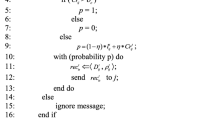Abstract
One of the significant characteristics of ubiquitous environments is the need for trust management due to the vital role trust plays in the success of such environments. Recommenders constitute an important component for managing trust because they can corrupt the recommendation network by providing bogus feedback resulting in losing transactions with trustworthy nodes and committing transactions with untrustworthy nodes. Honesty checking schemes, assume that a recommender is consistent and thus does not change its recommendation behavior. In this paper, we shed light on the inconsistent recommenders’ behavior. That is, recommenders change their recommendation strategy. To the best of our knowledge, this is the first attempt at linking the behavior change to honesty checking. We propose a new honesty checking algorithm and show through extensive simulation experiments its performance compared to existing honesty checking algorithms.
Similar content being viewed by others
References
Abdul-Rahman, A. (2005). A framework for decentralised trust reasoning. Ph.D. thesis, University College London.
Abdul-Rahman, A., & Hailes, S. (2000). Supporting trust in virtual communities. In Hawaii int’l conf. system sciences.
Aberer, K., & Despotovic, Z. (2001). Managing trust in a peer-2-peer information system. In 10th int’l conf. information and knowledge management (CIKM’01) (pp. 310–317).
Azzedin, F., Maheswaran, M., & Mitra, A. (2006). Trust brokering and its use for resource matchmaking in public-resource grids. Journal of Grid Computing, 4(3), 247–263.
Burmester, M., Le, T. V., & de Medeiros, B. (2006). Towards provable security for ubiquitous applications. In Information security and privacy (pp. 295–312). Berlin: Springer.
Chen, H., Wu, H., Zhou, X., & Gao, C. (2008). Reputation-based trust in wireless sensor networks. In The 2007 international conference on multimedia and ubiquitous engineering (MUE07).
Feldman, M., Lai, K., Stoica, I., & Chuang, J. (2004). Robust incentive techniques for peer-to-peer networks. In 5th ACM conference on electronic commerce (pp. 102–111).
Fernandez-Gago, M. C., Roman, R., & Lopez, J. (2007). A survey on the applicability of trust management systems for wireless sensor networks. In The 3rd international workshop on security, privacy, and trust in pervasive and ubiquitous computing (SecPerU 2007).
Group, U. W. A. W. (2006). Ubiquitous web applications working group charter. http://www.w3.org/2006/10/uwa-charter.html.
Hwang, Y., & Yuan, S. (2007). A privacy-aware identity design for exploring ubiquitous collaborative wisdom. In Computational science (pp. 433–440). Berlin: Springer.
Jin, Y., Gu, Z., & Ban, Z. (2007). Restraining false feedbacks in peer-to-peer reputation systems. In International conference on semantic computing (pp. 304–312).
Kamvar, S., Schlosser, M., & Garcia-Molina, H. (2003). The eigentrust algorithm for reputation management in P2P networks. In 12th international world wide web conference (pp. 640–651).
Kristiansson, J. (2006). On technologies for ubiquitous multimedia communication. Ph.D. thesis, Lulea University of Technology, Sweden.
Krukow, K. (2007). Towards a theory of trust for the global ubiquitous computer. Ph.D. thesis, University of Aarhus, Denmark.
Liu, J., & Issarny, V. (2007). An incentive compatible reputation mechanism for ubiquitous computing environments. Journal International Journal of Information Security, 6(5), 711–721.
Papaioannou, T., & Stamoulis, G. (2005). An incentives’ mechanism promoting truthful feedback in peer-to-peer systems. In The 5th IEEE international symposium on cluster computing and the grid (CCGrid 2005) (pp. 275–283).
Ries, S., Kangasharju, J., & Mühlhäuser, M. (2007). Modeling trust for users and agents in ubiquitous computing. In KiVS 2007 (pp. 51–62).
Rodriguez, P., Tan, S., & Gkantsidis, C. (2006). On the feasibility of commercial, legal P2P content distribution. ACM SIGCOMM Computer Communication Review, 36(1), 75–78.
Roman, R., Fernández-Gago, M. C., & Lopez, J. (2007). Featuring trust and reputation management systems for constrained hardware devices. In Davide, F. (Ed.), ACM international conference proceeding series : Vol. 302. Autonomics (p. 6). New York: ACM.
Selçuk, A., Uzun, E., & Pariente, M. (2008). A reputation-based trust management system for P2P networks. International Journal of Network Security, 6(3), 235–245.
Sen, S., & Sajja, N. (2002). Robustness of reputation-based trust: Boolean case. In 1st int’l joint conf. autonomous agents and multi-agent systems (AAMAS-02) (pp. 288–293).
Shankar, N., & Arbaugh, W. (2002). On trust for ubiquitous computing. In Workshop on security in ubiquitous computing (UBICOMP 2002).
Srinivasan, A., Teitelbaum, J., Liang, H., Wang, J., & Cardei, M. (2007). On trust establishment in mobile ad hoc networks. In Boukerche, A. (Ed.), Reputation and trust-based systems for ad hoc and sensor networks. New York: Wiley.
Walter, T., Bussard, L., Robinson, P., & Roudier, Y. (2004). Security and trust issues in ubiquitous environments—the business-to-employee dimension. In SAINT workshops (pp. 696–701).
Wang, Y., & Vassileva, J. Bayesian network-based trust model. Web Intelligence, 2003. WI 2003. Proceedings. IEEE/WIC International Conference (pp. 372–378) (13–17 Oct. 2003).
Whitby, A., Jøsang, A., & Indulska, J. (2005). Filtering out unfair ratings in Bayesian reputation systems. The Icfain Journal of Management Research, 4(2), 48–64.
Xie, C., Chen, G., Vandenberg, A., & Pan, Y. (2008). Analysis of hybrid p2p overlay network topology. Computer Communications, 31(2), 190–200.
Xiong, L., & Liu, L. (2004). Peertrust: Supporting reputation-based trust for peer-to-peer electronic communities. IEEE Trans. Knowledge & Data Engineering, 16(7), 843–857.
Yan, Z., & Niemi, V. (2005). A trust model for ubiquitous systems based on vectors of trust values. In The seventh IEEE international symposium on multimedia (ISM 05).
Yan, Z., & Niemi, V. (2008). Towards user driven trust modeling and management. In iTrust/PST08.
Yu, B., & Singh, M. P. (2002). An evidential model for distributed reputation management. In 1st int’l joint conf. autonomous agents and multi-agent systems (AAMAS-02) (pp. 294–301).
Author information
Authors and Affiliations
Corresponding author
Additional information
This research is supported by King Fahd University of Petroleum and Minerals under Research Grants IN070365 and FT060028.
Rights and permissions
About this article
Cite this article
Azzedin, F., Ridha, A. Feedback behavior and its role in trust assessment for peer-to-peer systems. Telecommun Syst 44, 253–266 (2010). https://doi.org/10.1007/s11235-009-9263-9
Published:
Issue Date:
DOI: https://doi.org/10.1007/s11235-009-9263-9




